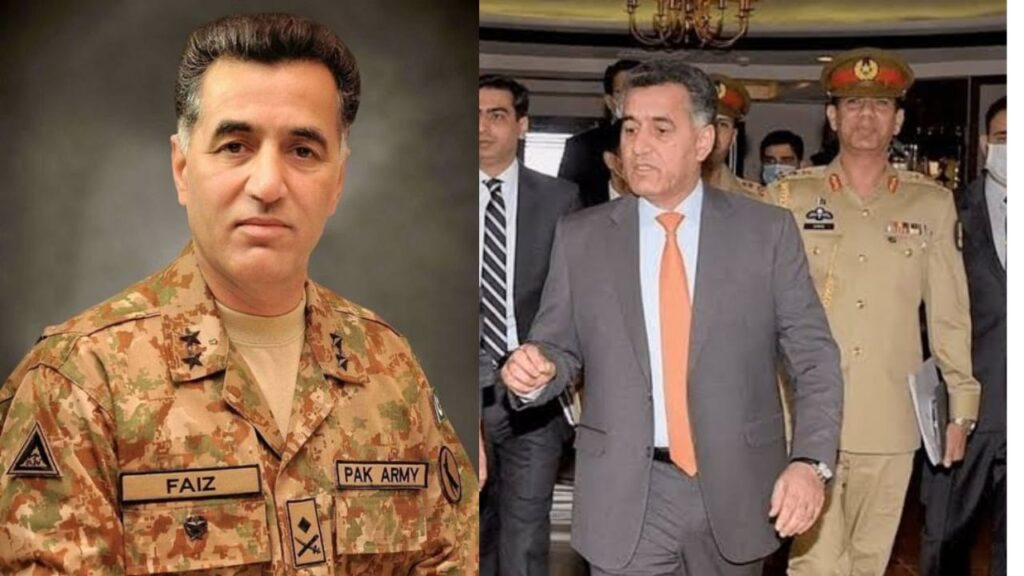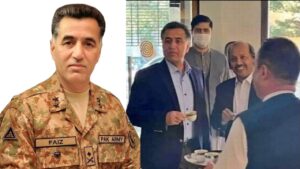
With the arrest of Faiz Hameed, the Pakistan Army has punished one of its own. This serves as a warning.
The arrest sends a message to the military community—particularly to retired and serving officers who supported Imran Khan and opposed the current chief, General Asim Munir—that they need to change their ways.
Ultimately, the Pakistan Army has made the decision to use its political “nuclear weapon” in order to destroy the opponents of the current commander, stop more upheaval, and re-establish organisational leadership. Lieutenant General Faiz Hameed, the former head of Inter-Services Intelligence (ISI), was detained in an extraordinary action due to allegations of corruption.

Since General Hameed will be tried in a military court, and if the charges are proven, he will face a court-martial, he was arrested in his military uniform. This also means that if found guilty, he will be stripped of his military decorations, allowances, and privileges and discharged from service.
Reportedly, the arrest followed an investigation initiated by the military in April of this year, in line with the Supreme Court’s ruling on the Top City housing scheme in November last year. The complainant accused the ISI chief and his brother of using the intelligence agency to pressure Hamid’s elder brother, Najaf Hamid, a junior revenue officer, into transferring a valuable piece of private land. The owner of Top City was allegedly harassed and pressured to obtain the desired outcome.
Also Read: As it was Matildas defeated China 2-0 to provide Lydia Williams with the ideal send-off
It is also noteworthy that during his tenure as ISI chief, Faiz Hameed was reportedly in the habit of extorting and manipulating private sector members to gain both personal and institutional benefits. For instance, people I spoke to in Karachi claimed that he forced the owners of Independent Power Producers (IPPs) to renegotiate contracts to benefit the state. He then used similar tactics to help his brother acquire hundreds of acres of land in his home districts of Talagang and Chakwal, which were registered under family members’ names.The military is said to have acquired all the information required to move forward with the corruption prosecutions.
But in reality, the military does not prioritise fighting corruption. If high-ranking officials engage in extortion or utilise it for their own gain, the service might overlook it. The National Accountability Bureau (NAB) is investigating Faiz Hameed and his brother Najaf Hamid for possible corruption, although these investigations are really only fronts to punish them for other offences. Senior journalist Mariana Babar questioned the military’s public relations institution on X (formerly Twitter) about the reasoning behind such swift action, noting that court orders usually aren’t followed so quickly in other cases.
The likely reason behind this move appears to be that Hameed was attempting to incite disobedience and rebellion within the army against the army chief. As senior journalist Arifa Noor mentioned in her tweet, “People should be less concerned about [Faiz Hameed’s] trial and more worried about the internal weakness and discipline issues.” The corruption case seems to have been constructed to show the public that Imran Khan and his favored ISI chief engaged in the very behaviors they claimed to oppose, but the military leadership’s real issue lies with internal discipline problems.

The military is said to have acquired all the information required to move forward with the corruption prosecutions. In actuality, though, corruption is not the military’s top priority. The service may ignore it if senior officials participate in extortion or use it for personal benefit. Such charges suggest that he was involved in increasing political support within the military for Imran Khan and his party, Pakistan Tehreek-e-Insaf (PTI).
Some other sources have claimed that Hameed was very shrewd and had infiltrated the political system. He reportedly infiltrated both the Pakistan Peoples Party (PPP) and Pakistan Muslim League. Allegedly, he even had some supporters in the Shehbaz Sharif cabinet. But the more serious issue was the “network” he allegedly established with the Tehrik-i-Taliban Pakistan (TTP), which was used to garner support for PTI in the elections in Khyber Pakhtunkhwa (KP) province. The picture of Faiz Hameed sipping tea at the Serena Hotel in Kabul, where he famously said, “Don’t worry, everything will be alright,” comes to mind.
If there is evidence to establish his ties with the TTP, it not only shows a clear violation of military rules but also reveals his connection with terrorists who are targeting the army and endangering national security.
This military tribunal, which aims to stop the development of indiscipline among the armed services, will be nothing less than explosive. The military community, particularly the active and retired officers who backed PTI and opposed the current head, General Asim Munir, is being alerted by this arrest to the need to change their direction.
The arrest sends a message to the military community—particularly to retired and serving officers who supported Imran Khan and opposed the current chief, General Asim Munir—that they need to change their ways.
Ultimately, the Pakistan Army has made the decision to use its political “nuclear weapon” in order to destroy the opponents of the current commander, stop more upheaval, and re-establish organisational leadership. Lieutenant General Faiz Hameed, the former head of Inter-Services Intelligence (ISI), was detained in an extraordinary action due to allegations of corruption.
Since General Hameed will be tried in a military court, and if the charges are proven, he will face a court-martial, he was arrested in his military uniform. This also means that if found guilty, he will be stripped of his military decorations, allowances, and privileges and discharged from service.
Reportedly, the arrest followed an investigation initiated by the military in April of this year, in line with the Supreme Court’s ruling on the Top City housing scheme in November last year. The complainant accused the ISI chief and his brother of using the intelligence agency to pressure Hamid’s elder brother, Najaf Hamid, a junior revenue officer, into transferring a valuable piece of private land. The owner of Top City was allegedly harassed and pressured to obtain the desired outcome.
It is also noteworthy that during his tenure as ISI chief, Faiz Hameed was reportedly in the habit of extorting and manipulating private sector members to gain both personal and institutional benefits. For instance, people I spoke to in Karachi claimed that he forced the owners of Independent Power Producers (IPPs) to renegotiate contracts to benefit the state. He then used similar tactics to help his brother acquire hundreds of acres of land in his home districts of Talagang and Chakwal, which were registered under family members’ names.The military is said to have acquired all the information required to move forward with the corruption prosecutions.
But in reality, the military does not prioritise fighting corruption. If high-ranking officials engage in extortion or utilise it for their own gain, the service might overlook it. The National Accountability Bureau (NAB) is investigating Faiz Hameed and his brother Najaf Hamid for possible corruption, although these investigations are really only fronts to punish them for other offences. Senior journalist Mariana Babar questioned the military’s public relations institution on X (formerly Twitter) about the reasoning behind such swift action, noting that court orders usually aren’t followed so quickly in other cases.
The likely reason behind this move appears to be that Hameed was attempting to incite disobedience and rebellion within the army against the army chief. As senior journalist Arifa Noor mentioned in her tweet, “People should be less concerned about [Faiz Hameed’s] trial and more worried about the internal weakness and discipline issues.” The corruption case seems to have been constructed to show the public that Imran Khan and his favored ISI chief engaged in the very behaviors they claimed to oppose, but the military leadership’s real issue lies with internal discipline problems.
The military is said to have acquired all the information required to move forward with the corruption prosecutions. In actuality, though, corruption is not the military’s top priority. The service may ignore it if senior officials participate in extortion or use it for personal benefit. Such charges suggest that he was involved in increasing political support within the military for Imran Khan and his party, Pakistan Tehreek-e-Insaf (PTI).
Some other sources have claimed that Hameed was very shrewd and had infiltrated the political system. He reportedly infiltrated both the Pakistan Peoples Party (PPP) and Pakistan Muslim League. Allegedly, he even had some supporters in the Shehbaz Sharif cabinet. But the more serious issue was the “network” he allegedly established with the Tehrik-i-Taliban Pakistan (TTP), which was used to garner support for PTI in the elections in Khyber Pakhtunkhwa (KP) province. The picture of Faiz Hameed sipping tea at the Serena Hotel in Kabul, where he famously said, “Don’t worry, everything will be alright,” comes to mind.
If there is evidence to establish his ties with the TTP, it not only shows a clear violation of military rules but also reveals his connection with terrorists who are targeting the army and endangering national security.
This military tribunal, which aims to stop the development of indiscipline among the armed services, will be nothing less than explosive. The military community, particularly the active and retired officers who backed PTI and opposed the current head, General Asim Munir, is being alerted by this arrest to the need to change their direction.







1 thought on “With the arrest of Faiz Hameed, the Pakistan Army has punished one of its own. This serves as a warning”
Hey people!!!!!
Good mood and good luck to everyone!!!!!